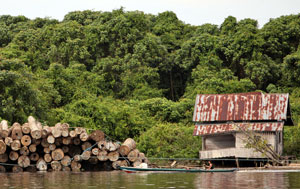AusAID and the Centre for International Forestry Research (CIFOR) have recently renewed a research partnership on Reducing Emissions from Deforestation and Forest Degradation (REDD+) in developing countries. REDD+ is an incentive-based scheme that aims to reduce greenhouse gas emissions by protecting forest cover. The development potential of REDD+ is significant–with over a billion people depending on forests for some portion of their livelihoods, forests are critical to achieving development goals.
Work under this research partnership will provide REDD+ practitioners and policy makers with the tools to ensure that REDD+ implementation helps to:
- reduce poverty
- build resilience to climate change
- protect local livelihoods
- protect rights and land tenure
- protect vulnerable groups, including women, people with disabilities, children and indigenous peoples.
As part of an extensive research project that has been supported under the partnership, the CIFOR has released a book that offers fresh insights into the progress achieved and challenges faced in REDD+ and suggests new ways of addressing some of them.
Analysing REDD+: Challenges and Choices draws on three years of research across Asia, Africa and Latin America, and takes a critical look at REDD+, asking how it has changed and how it is unfolding in specific national policy arenas. As the global community gears up for the next round of climate change negotiations, which will certainly include REDD+, Analysing REDD+ provides national and local policy makers, development agencies, forest institutions and organisations, as well as REDD+ practitioners, timely information and analysis on the kinds of challenges and options presented by REDD+.
An extensive outreach campaign to raise awareness of the publication, which included releasing embargoed copies to select media and launching the book on the sidelines of the Rio+20 conference, prompted a massive spike in interest for Analysing REDD+. The CIFOR webpage dedicated to the new publication received 58 000 views within a month of its launch.
CIFOR's Global Comparative Study on REDD+ has also released new research on Indonesia and Mozambique. Spanning the period 2007 to early 2012, The context of REDD+ in Indonesiadocuments how the country's REDD+ policies have been shaped amid an institutional, political and economic backdrop that both drives and seeks to address the country's deforestation and forest degradation. The context of REDD+ in Mozambique offers a preliminary analysis of how REDD+ policies can improve by reviewing the causes of forest carbon changes in the country and the legal, institutional and political processes that can stifle REDD+ growth.
AusAID's partnership with CIFOR is producing important outcomes. REDD+ is a new approach to protecting forests and providing enhanced livelihood options to forest dependent communities. A strong evidence base is needed to ensure that approaches to REDD+ are effective, with equitable impacts and co-benefits. This partnership is assisting to develop this evidence base, and will provide REDD+ policy makers with the tools to ensure REDD+ is implemented in a way that enhances poverty reduction impacts.

